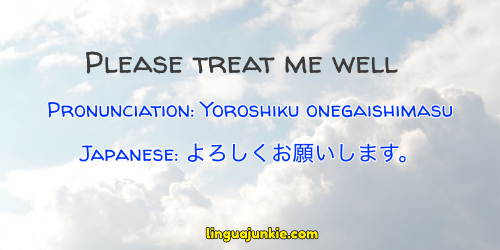Want to know how to introduce yourself in Japanese?
Quick and easy answer – just say:
- I am (name).
- English Pronunciation: Watashi wa (name) desu.
- Japanese: 私は (name) です。
But if you want to sound a little smarter… and introduce yourself the RIGHT way in Japanese…
…you should read on and see the FULL way to introduce yourself. And the beauty of this is…
If you learn to how to introduce yourself in Japanese, you can handle most simple Japanese conversations.
So, here’s what you’ll need for a self Japanese self introduction. You can also use this as a Japanese bio in your social profiles.
I’ll give you two ways.
The first one is a simple and easy one that most people use. It includes “my name is…” and “nice to meet you.” The second one is more lengthy where you can talk about yourself in more detail.
Way #1: The quick way to introduce yourself.
Everyone uses this. It’s used when meeting new people.
1. Nice to meet you – 初めまして
- English Pronunciation: Hajimemashite
- Japanese: 初めまして
“Hajimemashite (ha-jee-meh-mashte)” is how you say “nice to meet you” in Japanese. This word does not literally mean “nice to meet you” but it’s one of the many “Japanese set phrases” that are used without thinking.
2. My name is (name) – 私は (name) です
There can be several variations.
- I am (name).
- English Pronunciation: Watashi wa (name) desu.
- Japanese: 私は (name) です。
You should also listen and hear real Japanese – Press play below. Try this Free Lesson from JapanesePod101.com (click here to visit) for the complete explanation about introducing yourself!
Or, you can try this.
- My name is (name).
- English Pronunciation: Watashi no namae wa (name) desu –
- Japanese: 私の名前は(name)です。
Finally, you can try the most casual way to introduce yourself in Japanese.
- I’m (name)
- English Pronunciation: (name) desu.
- Japanese: (name)です。(Note: this is very casual)
- For example:
- Bobです。
- Bob desu.
- I am Bob.
Finally, you need this next final phrase.
3. Please treat me well – よろしくお願いします。
- English Pronunciation: Yoroshiku onegaishimasu
- Japanese: よろしくお願いします。

What in the world is “Please treat me well?” It is a rough translation and has no equivalent in English. This is simply a “Japanese set phrase” that you need to use in such encounters and first time meetings. Why? Because that’s how the Japanese language and culture work. Because politeness. And because why wouldn’t you be treating a new person well?
So, here’s your script you can use.
初めまして。私は (name) です。よろしくお願いします。
Hajimemashite. Watashi wa (name) desu. Yoroshiku onegaishimasu.
You can use this safely as it’s quite polite. If you want to a super cool and casual introduction, then just drop a few words.
(name) です。よろしく。 (name) desu. Yoroshiku.
Way #2 – the 自己紹介 (jikoshoukai)
In other words, this is your elevator pitch that you’ll use over and over when you need to talk about yourself.
In Japanese, this is called a jikoshoukai (自己紹介) or self-introduction, that’s a lot more detailed than the method we used above. It’s often used in group settings when everyone has to say a little about themselves. For example, you’ll hear this at work events or group dates.
This second method is very useful to know because now you can talk about yourself.
- Hello, nice to meet you.
- My name is ……
- I am from …….
- I am …… years old.
- I am a (student/occupation).
- I’ve been learning Japanese for…
- I am learning Japanese because…
- Please treat me well.
Here’s how to introduce yourself in Japanese with the full “jikoshoukai.”
1. こんにちは, 初めまして – Hello, nice to meet you.
- Hello – konnichiwa – こんにちは
First, we have the word “konnichiwa” which is just a way to say hello in Japanese.
- Nice to meet you – Hajimemashite – 初めまして
2. (name) です My name is ……
- (name) desu.
- (name) です。
So, if you’re Bob, you say “Bob desu.”
3. (Place) からきました。 I am from …….
- (Place) kara kimashita. (Place) からきました。
- Use it to say where you’re from.
Being able to talk about where are you from in Japanese is a must. Japanese people will also ask you so you should have an answer ready. Or, you can mention your ethnicity or nationality instead.
- Amerikajin desu. アメリカ人です。
- I am American.
4. (age)歳です。 I am …… years old.
- (age) sai desu. (age)歳です。
For this one, you will need to know Japanese numbers. Here are some random examples though:
- I am 25 years old.
- Ni juu go sai desu.
- 25歳です。
- I am 19 years old.
- Juu kyuu sai desu.
- 19歳です
- I am 27 years old.
- Ni juu nana sai desu.
- 27歳です。
- I am 34 years old.
- San juu yon sai desu.
- 34歳です。
5. (position)です。 I am a (student/occupation).
Next, you may want to talk about what you do. Whether you’re a student or working.
- (position) desu. (position)です。
- I am a student: gakusei desu. 学生です。
- Shigoto wa (job) desu. 私の仕事は(job) です。
- My job is programming: Watash no shigoto wa puroguramingu desu. 仕事プログラミングです。
- (Job) o shiteimasu. (Job)をしています。
- Just means “I’m doing (job),” as if you’re answering “What do you do.”
6. I’ve been learning Japanese for…
This line is also good to know. If you’re decent, Japanese people will be impressed and will want to know how long you’ve been learning for.
- (time)kan nihongo o benkyou shiteimasu. (time)間日本語を勉強しています。
- example: 1 year. Ichi nen kan nihongo o benkyou shiteimasu. 一年間日本語を勉強しています。
7. I am learning Japanese because…
Of course, being able to talk about your reason is also important. People will ask you.
- (Reason) da/kara, nihongo o benkyoushiteimasu. (reason) だ/から、日本語をべんきょうしています。
- example: Because you’re interested in Japan.
- Nihon ni kyoumi ga aru kara, nihongo o benyoishiteimasu. 日本に興味があるから、日本語をべんきょうしています。
9. Please treat me well
- Yoroshiku onegaishimasu – よろしくお願いします。
This “yoroshiku onegaishimasu” is one of the most common Japanese set phrases that’s used all the time. You’ll hear it a lot. It has various meanings depending on the context, but here… it’s just “please treat me well” or “be good to me.” Don’t think it much here.
So, here’s your Japanese introduction script.
こんにちは, 初めまして。私は (name) です。アメリカ人です。(age)歳です。仕事は(job) です。 (time)間日本語を勉強しています。 (reason) だ/から、日本語をべんきょうしています。よろしくお願いします。
Or, if you can’t read yet and just want to say it out loud:
Konnichiwa, Hajimemashite. Watashi wa (name) desu. Amerikajin desu. (age) sai desu. Shigoto wa (job) desu. (Time)kan nihongo o benkyou shiteimasu. (Reason) da/kara, nihongo o benkyoushiteimasu. Yoroshiku onegaishimasu.
Conclusion – Back To You!
Did you notice that I took out all of the “watashi wa” from most of the sentences?
Why did I do that?
You should omit 90% of the “watashi’s” there to sound more natural.
After you said it once, people understand you’re talking about yourself. Japanese is a very context-heavy language and there’s no point in going “watashi wa… watashi wa… watashi wa…” in every sentence because you already set the context.
So, that’s how to introduce yourself in Japanese naturally.
And you can use the phrases above for your Japanese bio on your socials.
Here’s what you do now.
- Create your self introduction.
- Leave me a comment and introduce yourself.
- And start learning even more Japanese.
– The Main Junkie
P.S. For a similar guide, check out this other article: how to introduce yourself in Japanese.
P.P.S. I highly recommend this for Japanese learners. If you REALLY want to learn to Japanese with effective lessons by real teachers – Sign up for free at JapanesePod101 (click here) and start learning!

[…] This is a great question to know as you will hear it millions of times. In your cause, someone may ask you and you will have to introduce yourself in Japanese. […]
[…] If you want be able to answer this question, then you’ll need to learn how to introduce yourself in Japanese. […]
[…] How To Introduce Yourself in Japanese: 2 Best Ways […]
I’ve never heard a Japanese person pause between saying their last name and first name. They always say both names together as if their names were just one long word and they blurt it out as fast as humanly possible. They say such a mouthful and are completely incomprehensible
Unless it’s a formal occasion, why do they need to give both names?
I always dread hearing their names.
初めまして。私の名前はケイリンです。アメリカ人です。1月にはじめて日本にいきます。私はXで作家です。6ヶ月間日本語をべんきょうしています。日本に住みたいから、日本語をべんきょうしています。よろしくお願いします。:D
初めまして。私の名前はケイリンです。アメリカ人です。1月にはじめて日本にいきます。私はXで作家です。6ヶ月間日本語をべんきょうしています。私は日本に住みたいから、日本語をべんきょうしています。よろしくお願いします。:D
I didnt really like to repeat watashi, watashi, watashi… sounds really bad. Could you teach us more ways of saying this for example “‘name’ to moushimasu” instead of using watashi so much, please? Thank you!
こんにちわ!
ジョナサンさんです!
よろしく!
please help me
はじめまして。私はワイクルー•ロリーです。ユタから来ました。23歳です。スノー短期大学の生徒です。1年生です。私は1年間日本語を勉強しています。まだ上手じゃありません。日本に興味があるから, 日本語をべんよいしています。よろしくお願いします。
こんにちは, 初めまして。私はAlexです。
Nice! Great lesson!
[…] Remember how to introduce yourself in Japanese?(click) It follows the same pattern. […]
[…] Japanese Phrases: How To Introduce Yourself in Japanese […]